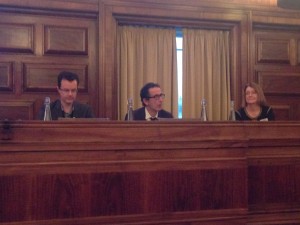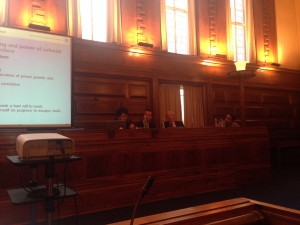In this post, we report on the “Connected Histories of Decolonisation” workshop, which took place at Senate House, London, 13-14 November 2014.
Over the past few years, decolonisation workshops, organised by the Institute of Commonwealth Studies in conjunction with King’s College London, have become a regular diary fixture for scholars of the end of empire. The workshops, which take place on a termly basis, provide an important opportunity for those working on decolonisation to meet and discuss their current research in a friendly and informal setting, with contributions from PhD students and early-career scholars particularly welcomed. The November 2014 conference, organised in collaboration with the Centre of European and International Studies Research at the University of Portsmouth, continued the existing, successful workshop format, with a two-day conference dedicated to the discussion of “Connected histories of decolonisation”.
After a brief welcome to delegates, day one opened with a interdisciplinary panel, chaired by Natalya Vince (Portsmouth), exploring the theme of ‘Creating spaces, connections and networks of resistance’. The first paper, presented by James Renton (Edge Hill), explored the global political space of the interwar years, embodied in, but not limited to, the League of Nations, in which the principal of national consciousness first came into being. According to Renton, although nationalist ambitions were not realised in the period between 1917 and 1940, performances of nationalism during this era laid the foundations for the post-colonial world order. Renton, therefore, moved beyond a post-war chronology for the end of European colonial rule, locating the beginnings of the decolonisation process much earlier in the twentieth century. An alternative temporal standpoint was also present in Uma Kothari’s (Manchester) paper, which explored the 500 anti-colonial nationalists exiled to the Seychelles by the British government between the 1800s and the 1950s. According to Kothari, by banishing perceived threats to colonial authority to this remote Indian Ocean archipelago, the British government inadvertently encouraged transnational networks of solidarity and resistance. By focusing on the Seychelles, Kothari also offered an alternative geographical perspective on empire in the Indian Ocean zone. New geographies of decolonisation were similarly at the heart of the final paper of the panel, in which Clemens Hoffmann (Bilkent) analysed Ottoman Turkey and Ethiopia as ‘anti-colonial empires’. Taking International Relations theory, and particularly efforts to decolonise IR, as his starting point, Clemens challenged the coloniser/colonised binary by comparing and contrasting these two examples of ‘successful’ state-led non-Western anti-colonial orders, which influenced the global decolonisation process.
 Clive Webb and Martin Evans discuss the global impact of the Atlantic Charter, in a panel chaired by Margaret Majumdar.
Clive Webb and Martin Evans discuss the global impact of the Atlantic Charter, in a panel chaired by Margaret Majumdar.
The second panel, chaired by Philip Murphy (ICWS), continued this discussion of the connected and ‘competing narratives of decolonisation’. Drawing upon a wide range of visual source material, including propaganda images from the People’s Republic of China and Taiwan, Andrew Kuech (New School of Social Research) explored how alternative ideas of an ‘imagined American empire’ were used by both Communists and Republicans to construct a divergent idea of the Chinese nation. Alternating ambitions and objectives were also addressed in Tim Livsey’s (KCL) paper, which explored the role played by the UK and US in higher education reform in Nigeria during decolonisation era. By unpicking the tensions between and within the Anglo-American special relationship, Livsey’s paper shed new light on the complexities of the Western Alliance, whilst simultaneously painting decolonisation as both a competitive and a collaborative affair. The final contribution to this geographically diverse panel came from Robert Fletcher (Exeter) and focused on desert regions across the Afro-Asian landmass. According to Fletcher, the challenges of governing these hostiles regions contributed to a shared, distinctive experience of decolonisation and the Cold War in the arid world.
‘Connected histories of nationalism’ in Francophone Africa provided the unifying theme of panel three, chaired by Ed Naylor. Thomas Sharp (Oxford Brookes) spoke first on the campaigns led by the Union of the Peoples of Cameroon (UPC) for the unification of French Cameroun with British Cameroon, and its independence as a united territory. In his paper, Sharp explored the ways in which the UPC crossed colonial boundaries to garner support for its cause, and how this ability to transcend borders, in turn, was dependent upon the extra-metropolitan framework of the UN Trusteeship system. The importance of international institutions in shaping the transfer of power from the coloniser to the colonised also came to the fore in Camille Evrard’s (Paris I) paper on the decolonisation of Mauritania. Camille presented a complex picture of the competing internal and external demands to this territory, describing, for example, the ways in which the presence of the French army was crucial to maintaining Mauritanian independence but, paradoxically, also undermined Mauritania’s claims to statehood.
The final panel of day one, chaired by Keith Somerville (ICWS), looked at ‘networks, models and interconnections’. In her paper, Marta Musso (Cambridge) explored the role played by the oil industry in the decolonisation of Algeria, particularly the struggle between Algerian nationalists and the French to control oil resources in the region. Joanna Warson (Portsmouth) presented her research on French participation in Nigeria and the Gold Coast, revealing previously unknown ways in which France sought to protect and extend its African sphere of influence. Different trans-imperial connections were explored in Bruno C. Reis’(ICS-UL) paper on the importance of the crisis in the Belgian Congo in shaping the Portuguese approach to its African colonies. These final two papers, therefore, demonstrated the importance of examining not only the connections between different nationalist groups but also the inter-connections between the different European colonial administrations.
***
Even torrential rain could not deter delegates from making their way to Senate House for day two of the “Connected histories of decolonisation” workshop on Friday 14 November. Andrew W. M. Smith (UCL/ QMUL/ Brunel/ Chichester) opened the morning’s proceedings. Smith’s paper analysed vernacular broadcasting in French and Hausa by the BBC in Francophone Africa as part of a wider strategy to re-frame Britain’s world role in the post-independence era. The re-formulation of Britain’s global role was also at the heart of Charlotte Riley’s (York) paper. Riley presented the Labour Party’s international development policies as a type of post-colonial diplomacy, which permitted continued engagement with the former colonies without undermining Labour’s anti-colonial traditions or risking being accused of neo-colonialism. The final paper of this panel on ‘diplomacy, development and domestic influences on British decolonisation and its aftermath’ was presented by Rosie Coffey (LSE). Coffey analysed British press coverage of the Sharpeville massacre, arguing that reports in the UK were neither moralising nor straightforward, with Sharpeville represented as the inception of the African struggle rather than its defeat.
The second panel of the morning, chaired by Sarah Stockwell, continued this discussion of South Africa from an alternative perspective, examining the relationship between ‘France and South Africa’. Anna Konieczna’s paper explored the contacts between Francophone moderate states and South Africa, initiated by African cell at the Elysée Palace, as well as the Afrique-Levant department at the Quai d’Orsay. Konieczna emphasised, therefore, the crossing-cutting influences that shaped post-colonial Africa. Roel van der Velde (Portsmouth) offered an alternative perspective on Franco-South African relations in his paper, which analysed arms sales from Paris to Pretoria as a source of insight into the military-industrial complex in France and South Africa.
 The forced labour panel: Romain Tiquet, Alexander Keese, Tony Chafer (chair) and Victor Fernandez Soriano.
The forced labour panel: Romain Tiquet, Alexander Keese, Tony Chafer (chair) and Victor Fernandez Soriano.
Forced labour was the theme of the penultimate panel, chaired by Tony Chafer (Portsmouth). Romain Tiquet (Humboldt/ ForcedLabourAfrica) analysed penal camps in French-ruled Senegal, underlining the importance of forced labour to the colonial project, as well as the ways in which incarceration was resisted. Victor Fernandez Soriano’s paper (Université Libre de Bruxelles/ ForcedLabourAfrica) explored legal forms of forced labour in the Belgian Congo after 1945, in contrast to the British and French African empires, where forced labour was officially abolished at this time. According to Soriano, this ‘Belgian enigma’ can be explained with reference to the different African colonial experiences of Britain and France, on the one hand, and Belgium, on the other. Alexander Keese (Humboldt/ ForcedLabourAfrica) concluded this panel with discussion of the persistent practice of forced labour in Afrique Equatoriale Française, in spite of its official abolition by the French in 1946. Keese’s paper also moved beyond the colonial/ post-colonial divide, emphasising the continued importance of colonial discourse in post-independence strategies to integrate rural populations.
The final panel of the workshop, chaired by Margaret Majumdar, comprised of two papers from a wider project to map the ‘the global impact of the August 1941 Atlantic Charter’. Martin Evans (Sussex) looked at the spread of the Atlantic Charter in Algeria, Morocco and Tunisia. According to Evans, the diffusions of these ideas across North Africa formed part of a wider global anti-colonial moment, which shaped the development of nationalisms across the Maghreb. Clive Webb’s (Sussex) paper offered an alternative geographical perspective by exploring the ways in which the Atlantic Charter was received by African Americans. In so doing, Webb situated the early African American civil rights movement within the global anti-imperial struggle, whilst simultaneously bringing to light tensions between Britain and the US over the Atlantic Charter.
The workshop concluded with a short round table discussion, with remarks from Philip Murphy and Sarah Stockwell, bringing together some of the different themes discussed across the two days and emphasising the new possibilities available to historians of decolonisation by adopting a connected history approach.
***
We would like to thank everyone who participated in this workshop for their excellent papers and interventions. We would also like to thank the Institute of Commonwealth Studies, King’s College London and the Centre of European and International Studies Research at the University of Portsmouth for generously supporting this event.
